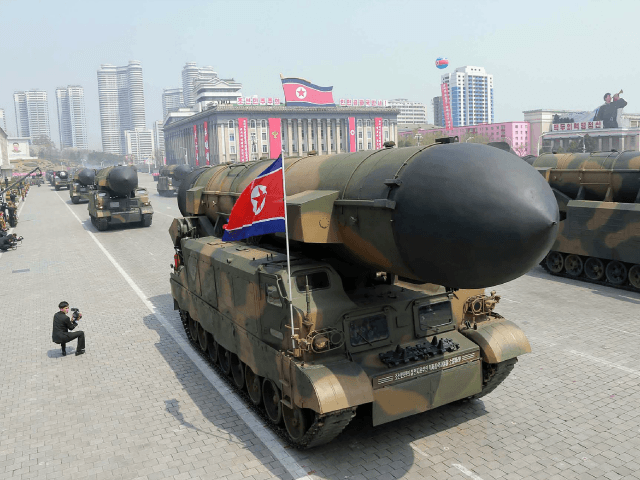Secretary of Defense James Mattis and Secretary of State Rex Tillerson co-authored a Wall Street Journal op-ed on Monday titled, “We’re Holding Pyongyang to Account.”
The secretaries argue that the Trump administration is using a “peaceful pressure campaign” to achieve the “complete, verifiable, and irreversible denuclearization of the Korean Peninsula and a dismantling of the regime’s ballistic missile programs.”
Mattis and Tillerson describe this as a “new policy of strategic accountability” that will replace the failed Obama administration policy of “strategic patience.”
“The U.S. has no interest in regime change or accelerated reunification of Korea,” the authors hasten to add. “We do not seek an excuse to garrison U.S. troops north of the Demilitarized Zone. We have no desire to inflict harm on the long-suffering North Korean people, who are distinct from the hostile regime in Pyongyang.”
Even with these options off the table, Mattis and Tillerson argue that American diplomacy is “backed by military options.” That is where the editorial grows a little vague because it clearly acknowledges North Korea is showing little interest in the sort of negotiations Mattis and Tillerson envisions and has slammed the door shut on overtures from both Washington and Seoul.
Perhaps the WSJ piece is primarily intended for a Chinese audience since Mattis and Tillerson highly praise South Korea’s decision to continue with the deployment of the THAAD anti-missile system – a project that was in doubt after former President Park Geun-hye was impeached and replaced by the more China-friendly President Moon Jae-in.
THAAD is enormously irritating to China because its powerful sensors can monitor activity far beyond the borders of North Korea. Mattis and Tillerson almost playfully tweak Beijing by insisting that “technically astute Chinese military officers understand the system poses no danger to their homeland.” Technically astute Chinese officers who say that in public should expect short careers with unhappy endings.
The op-ed calls on China and Russia to refrain from helping North Korea avoid the latest round of tough sanctions while lecturing Pyongyang that it has no military option at all. “Any attack will be defeated, and any use of nuclear weapons will be met with an effective and overwhelming response,” the secretaries declare, warning North Korea not to “continue further down the dead alley of belligerence, poverty, and isolation.”
The problem is that North Korea sees no such future ahead, once it has the reliable capability to deliver nuclear weapons on an intercontinental scale. The first objective of global nuclear blackmail will be lifting tough sanctions, which the Kim regime views as acts of war.
In theory, any tough sanctions policy will destabilize the targeted regime, since the leadership will reliably ensure the worst consequences fall upon their people. The normal sanctions calculation involves making bad behavior so costly that the regime changes its ways. Can that equation resolve itself fast enough when the regime is at most only months away from possessing nuclear ICBMs?
If not, and sanctions are truly crippling the regime, how might it use the ultimate threat of nuclear missiles to push sanctions away? Mattis and Tillerson’s op-ed might be interpreted as a signal to North Korea, and its Chinese patrons, that the latest round of U.N. sanctions cannot be blackmailed away.
There might be a little time left, as South Korea’s Defense Minister Song Young-moo disputed the worst-case conclusions of U.S. and Japanese intelligence on Monday, stating that North Korea probably lacks re-entry shielding for ICBMs and might still be unable to miniaturize its nuclear bombs enough to fit them inside a warhead. It seems clear enough that the window to keep nuclear missiles out of Kim Jong-un’s hands is closing, as the difference between best and worst-case estimates can be measured in months.
Business Insider argues that there may be a glimmer of hope in the conditions attached to the latest statement of belligerent defiance from North Korean Foreign Minister Ri Yong-ho.
Ri told the ASEAN forum that North Korea “will, under no circumstances, put the nukes and ballistic rockets on the negotiating table; neither shall we flinch even an inch from the road to bolstering up the nuclear forces chosen by ourselves.”
However, Ri added a caveat: “unless the hostile policy and nuclear threat of the U.S. against the DPRK are fundamentally eliminated.” It might be grasping at straws to suggest this indicates a willingness to negotiate, given how extreme North Korea’s demands tend to be (i.e. ending all U.S. military drills with South Korea and removing the American military presence from the Korean Peninsula). But the optimistic viewpoint is that Ri did qualify his statement, and the regime he represents normally is not shy about using the most absolute and apocalyptic rhetoric.
Former U.N. Ambassador John Bolton, who advocates reunification of the two Koreas as the only permanent solution to the nuclear crisis, was highly critical of the Mattis-Tillerson editorial on Monday.
“If the Mattis-Tillerson op-ed in this morning’s Wall Street Journal is actually this administration’s policy on North Korea, then the game is over,” Bolton said on Twitter. “North Korea will be a full-fledged nuclear-weapons state in very short order. Iran will follow.”
“We should not continue twenty-five years of failed policies under a different slogan,” said Bolton. “Leave that to President Hillary Clinton.”

COMMENTS
Please let us know if you're having issues with commenting.